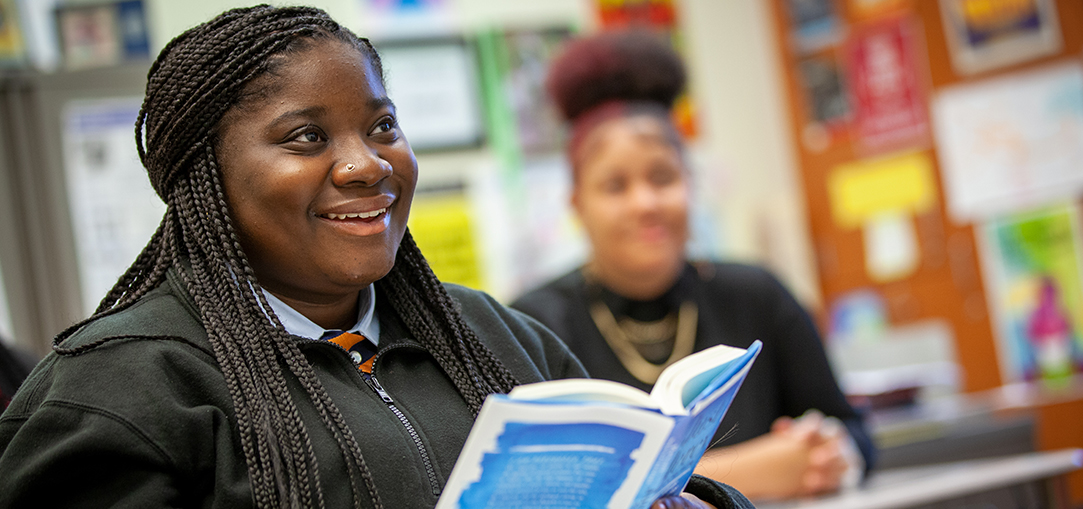Grit and Grace
October 07, 2015
Friends, Is it possible that 15 years have passed since our opening on September 12, 2001? Yes, today marks the first day of school in our fifteenth year. Wow!
There is a restaurant downtown called Grit & Grace. Like our mascot, the bulldog, grit and grace aptly describe The Neighborhood Academy: we would not be here without the grit of our founders (staff and board alike), our faculty, or our students. We would not be here if not for the grace of God and you, our donors. Let us take a moment to marvel at this miracle of grit and grace; let us take a moment, in the face of all who said it couldn’t be done or couldn’t be sustained, to remember our Alumni: Jana’a who is in the process of opening her own salon, Keka, a sickle cell researcher at UPMC Cancer Institute, Doug, in investments at Citizen’s Bank, Fred at Dollar Bank, Bianca, assistant general manager for Enterprise Leasing, Isaiah in the marketing department at American Eagle. These are just a few of the young people whose lives have been transformed…by the dint of their grit, God’s grace, and you.
Grit and grace was also be an underlying theme of "An Evening with Isabel Wilkerson” on September 23rd. The first Black woman in the history of American Journalism to win a Pulitzer Prize and the first African American woman to win for individual reporting, Ms. Wilkerson spent 10 years researching her book, The Warmth of Other Suns, a history of the African American migration North. During this Great Migration (1910-1970) some 6 million African Americans left the cotton fields and orange groves to move North; by the end of the Migration (1970) nearly HALF of Black America would be living outside the South.
To paraphrase Ms. Wilkerson, by the time the Migration was over the social, economic, and political infrastructure of every major northern and western city would be forever changed. In Chicago, for example, the African American population rocketed from 44,000 in 1910 to more than 1,000,000 by 1970. By the end of the twentieth century there were more Blacks living in the city of Chicago than in the entire state of Mississippi. (page 11)
These migrants from “within” were not met with resistance at Ellis Island as was the more traditional immigrant, but instead at every destination city along the way. Recent European immigrants, Northern-born Blacks, and whites of all classes resisted their entrance and their efforts. Forced into squalid, over-crowded tenements bounded by white neighborhoods zealously guarded by armed citizens, these amazing souls still poured North with a grit even their children could never understand; for at the end of the day, in spite of the dangers, hardship, and racism, once they crossed the Mason Dixon line, they were free— a freedom unknown in the Jim Crow South.
A measure of God’s grace is that these stalwart souls are the forebears of our staff and young people at The Neighborhood Academy. This desire to live free was so powerful that these ancestors LITERALLY risked life and limb to climb on board a freedom train heading West to Los Angeles or North to St. Louis, Chicago, Pittsburgh, Detroit, Cleveland, Philadelphia, or New York. It is a measure of God’s grace that they arrived— spent, exhausted, but alive—prepared to work long hours on 2-3 jobs a day, doing menial, underpaid tasks—all so that they could eventually own a house, send their kids to school, vote, and create a life for their families that no one had ever dreamed possible.
I invite you to read Isabel Wilkerson with the eyes of your heart, in the context of recent events: Ferguson, New York, Baltimore, Charleston, and yes, even Pittsburgh. All of us are beneficiaries of the Great Migration—music, food, art, business, education, politics; we are also inheritors of the unresolved issues of Jim Crow and the bigotry and fear that remains hidden in the North.
Ms. Wilkerson chooses “story” as the vehicle to communicate history. How fitting that The Neighborhood Academy is also a place of story—a story of overarching, transformational change. Let us celebrate this 15th year by thanking God and each other for the grit and the grace necessary to break the cycle of poverty and to transform the tide of violence, hatred, separatism, and slavery that still binds us all.
I pray that God continues to bless you and this work we do,
Jodie

